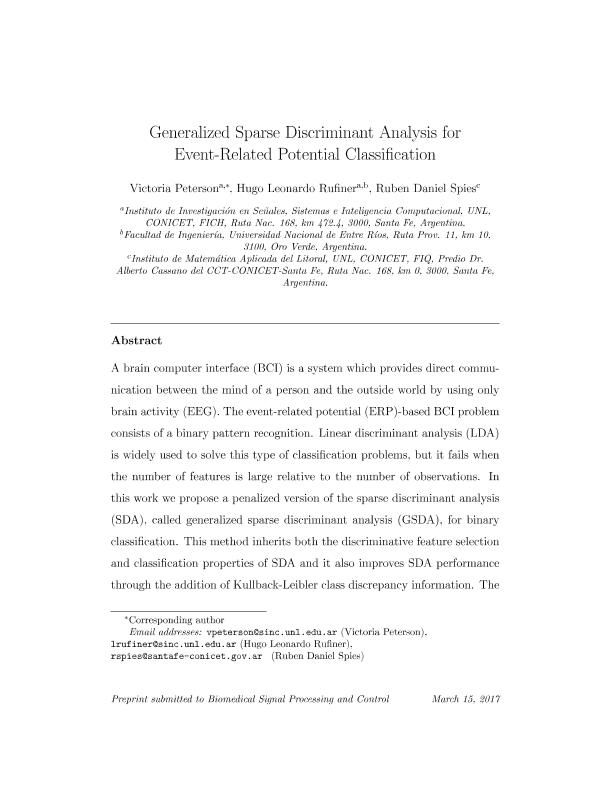Mostrar el registro sencillo del ítem
dc.contributor.author
Peterson, Victoria

dc.contributor.author
Rufiner, Hugo Leonardo

dc.contributor.author
Spies, Ruben Daniel

dc.date.available
2018-06-01T20:12:08Z
dc.date.issued
2017-03
dc.identifier.citation
Peterson, Victoria; Rufiner, Hugo Leonardo; Spies, Ruben Daniel; Generalized Sparse Discriminant Analysis for Event-Related Potential Classification; Elsevier; Biomedical Signal Processing and Control; 35; 3-2017
dc.identifier.issn
1746-8094
dc.identifier.uri
http://hdl.handle.net/11336/47045
dc.description.abstract
A brain computer interface (BCI) is a system which provides direct communication between the mind of a person and the outside world by using only brain activity (EEG). The event-related potential (ERP)-based BCI problem consists of a binary pattern recognition. Linear discriminant analysis (LDA) is widely used to solve this type of classification problems, but it fails when the number of features is large relative to the number of observations. In this work we propose a penalized version of the sparse discriminant analysis (SDA), called generalized sparse discriminant analysis (GSDA), for binary classification. This method inherits both the discriminative feature selection and classification properties of SDA and it also improves SDA performance through the addition of Kullback-Leibler class discrepancy information. The GSDA method is designed to automatically select the optimal regularization parameters. Numerical experiments with two real ERP-EEG datasets show that, on one hand, GSDA outperforms standard SDA in the sense of classification performance, sparsity and required computing time, and, on the other hand, it also yields better overall performances, compared to well-known ERP classification algorithms, for single-trial ERP classification when insufficient training samples are available. Hence, GSDA constitute a potential useful method for reducing the calibration times in ERP-based BCI systems.
dc.format
application/pdf
dc.language.iso
eng
dc.publisher
Elsevier

dc.rights
info:eu-repo/semantics/openAccess
dc.rights.uri
https://creativecommons.org/licenses/by-nc-sa/2.5/ar/
dc.subject
Brain-Computer Interface
dc.subject
Event-Related Potential
dc.subject
Kullbacj-Leibler Divergence
dc.subject
Penalization
dc.subject
Sparse Discriminant Analysis
dc.subject.classification
Ciencias de la Computación

dc.subject.classification
Ciencias de la Computación e Información

dc.subject.classification
CIENCIAS NATURALES Y EXACTAS

dc.subject.classification
Matemática Pura

dc.subject.classification
Matemáticas

dc.subject.classification
CIENCIAS NATURALES Y EXACTAS

dc.title
Generalized Sparse Discriminant Analysis for Event-Related Potential Classification
dc.type
info:eu-repo/semantics/article
dc.type
info:ar-repo/semantics/artículo
dc.type
info:eu-repo/semantics/publishedVersion
dc.date.updated
2018-05-31T18:17:33Z
dc.journal.volume
35
dc.journal.pais
Países Bajos

dc.journal.ciudad
Amsterdam
dc.description.fil
Fil: Peterson, Victoria. Consejo Nacional de Investigaciones Científicas y Técnicas. Centro Científico Tecnológico Conicet - Santa Fe. Instituto de Investigación en Señales, Sistemas e Inteligencia Computacional. Universidad Nacional del Litoral. Facultad de Ingeniería y Ciencias Hídricas. Instituto de Investigación en Señales, Sistemas e Inteligencia Computacional; Argentina
dc.description.fil
Fil: Rufiner, Hugo Leonardo. Consejo Nacional de Investigaciones Científicas y Técnicas. Centro Científico Tecnológico Conicet - Santa Fe. Instituto de Investigación en Señales, Sistemas e Inteligencia Computacional. Universidad Nacional del Litoral. Facultad de Ingeniería y Ciencias Hídricas. Instituto de Investigación en Señales, Sistemas e Inteligencia Computacional; Argentina. Universidad Nacional de Entre Ríos. Facultad de Ingeniería; Argentina
dc.description.fil
Fil: Spies, Ruben Daniel. Consejo Nacional de Investigaciones Científicas y Técnicas. Centro Científico Tecnológico Conicet - Santa Fe. Instituto de Matemática Aplicada del Litoral. Universidad Nacional del Litoral. Instituto de Matemática Aplicada del Litoral; Argentina. Universidad Nacional del Litoral. Facultad de Ingeniería Química; Argentina
dc.journal.title
Biomedical Signal Processing and Control

dc.relation.alternativeid
info:eu-repo/semantics/altIdentifier/doi/http://dx.doi.org/10.1016/j.bspc.2017.03.001
Archivos asociados
